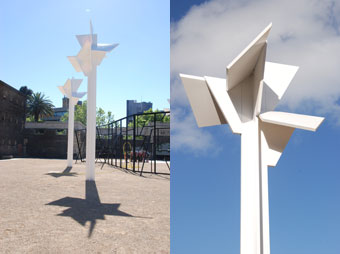2008Martin Boyce Download education notes (PDF 8pp) Requires Adobe Acrobat Reader. Visit the Adobe website to download a free copy. I’m trying to avoid nostalgia. By and large what you’re looking at is something from the past, but I want to bring it into the now and see what effect time has had on that. Martin Boyce in Moira Jeffrey, ‘Martin Boyce interview: pilgrim to a far pavilion’, Scotland on Sunday, 4 January 2009 The ‘new’ is a dead myth, a cobbled together invention; history is in process, and is continually being rewritten in these quotations. The ‘copy’ gives the illusion that there was an ‘original’ in a pristine historical context waiting to be plundered. By utilising such mythic forms, by quoting and seemingly misappropriating them, to a certain extent, Martin Boyce creates a dialogue with the ‘original’ work, which is now only a memory… Alexander Kennedy, ‘Martin Boyce: sculpture scene’, Map, www.mapmagazine.co.uk |  Martin Boyce’s 2008 Kaldor project, We are shipwrecked and landlocked, takes inspiration from the cubist-style trees created by twin brothers Joël and Jan Martel for the 1925 Exposition des arts décoratifs in Paris. 1925 was the year Le Corbusier erected the Pavillon de l’Esprit Nouveau, which outraged the authorities and set in motion a debate about modern architecture that continues to this day. The house of the future, Le Corbusier proposed, must be a machine à habiter, a ‘machine for living’, and not a three-dimensional backdrop for interior decorators. Boyce is drawn to the idea of a landscape that dreams itself into existence and hovers between a real physical place and an imaginary one. For his Kaldor project, the historically layered courtyard of the Old Melbourne Gaol was paved to resemble a desert (or a car park or underpass) and the entire artificial environment looked as if it had been dropped from outer space (hence the title). Beginning with the three palm-tree-like sculptures, the familiar starts to shift from its normal purpose. A fence sits in the middle of the space, rather than at the perimeter, thus functioning more as a semi-abstract sculpture. Rather in the stylised form of the Martel brothers’ sculptures, a hose crosses the fence, and a distorted wire-mesh bin sits alongside a drain grille. Read more about Martin Boyce. Details of Martin Boyce’s installation We are shipwrecked and landlocked 2008 in the courtyard of the Old Melbourne Gaol. Photos: Adam Free Courtesy Kaldor Public Art Projects | WORLD EVENTSWorld stockmarkets plunge, fuelled by the US subprime mortgage crisis Activists in Egypt use Facebook to rally for democracy Rising food and fuel prices trigger riots in the Third World Release of WALL-E, Pixar’s ecologically-minded animation Australian Prime Minister Kevin Rudd delivers a formal apology to the Stolen Generations MySpace Australia holds its first art competition Artists resale royalty right scheme introduced in Australia Police in Sydney confiscate artist Bill Henson’s photographs, sparking debate on censorship Biennale of Sydney, Revolutions – forms that turn, artistic director Carolyn Christov-Bakargiev Gift of the John Kaldor Family Collection to the Art Gallery of NSW announced 17th Kaldor project Two works – Fire Woman and Tristan’s Ascension (The Sound of a Mountain Under a Waterfall) – from Bill Viola’s The Tristan Project installed at St Saviour’s Church in the Sydney suburb of Redfern 18th Kaldor project Martin Boyce creates the installation We are shipwrecked and landlocked in the grounds of Old Melbourne Gaol | ||